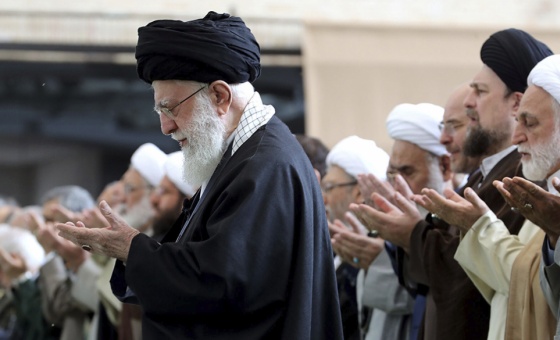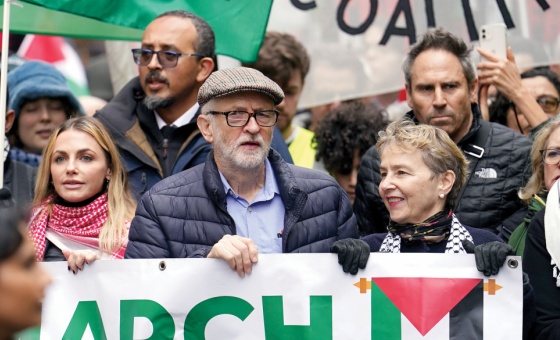This is the last article you can read this month
You can read more article this month
You can read more articles this month
Sorry your limit is up for this month
Reset on:
Please help support the Morning Star by subscribing here
THERE’S a new mood in this country as a consequence of the terrible pandemic that has killed so many and sent our whole society into lockdown.
We see it every Thursday night as people come to their doors and windows to clap and bang pots in support of the heroic NHS workers risking their lives to save ours.
There’s a new respect too for front-line workers of other kinds keeping the country going: for shopworkers, transport workers, refuse workers who have to keep coming into work and of course for the postal workers who for many vulnerable people form their only regular link to the outside world.
In the labour movement we are used to learning about the sacrifices of earlier generations.
We all honour the sacrifice made by the generation who defeated fascism in World War II, we rightly recognise the sacrifices of our forerunners from the Tolpuddle Martyrs to the Bryant and May matchwomen whose struggles gave birth to trade unionism.
Now we can talk about the sacrifices of today: the workers who are continuing to work because we need them, even though it puts them at risk of catching this deadly virus.
And we know that in periods of great sacrifice in the past our movement has stepped up.
The labour movement after the second world war was not prepared to let the world of the Great Depression, mass unemployment and poverty return.
They knew it had given birth to fascism. And they knew that they had proved they deserved better.
That generation built the welfare state and the NHS for which we are all now so grateful.
Many of the workers putting themselves in harm’s way for our sake today have been those given the rawest deal by bosses and politicians, paid poverty wages, languishing on insecure contracts, unable to afford a decent place to live or a proper holiday and unable to look forward to a comfortable retirement.
Look in contrast at the huge rewards given to CEOs like Royal Mail’s Rico Back, given a £6 million holden hello, yet who, like so many corporate bosses, doesn’t make an obvious contribution to society at all.
I’m not saying that’s always been true of company bosses. You could look back at someone like Henry Ford and say he was an innovator, his car manufacturing kept people in work, people used those cars— that’s a contribution.
But what are bosses at our big privatised services doing today?
Our union proposed to Royal Mail management and the government that we could become another emergency service during the crisis.
We have an unrivalled infrastructure, a network going to every single address in the UK every day of the week, and postal workers are some of the most trusted faces in the communities they serve.
But we’re not using those assets. Royal Mail is so narrow, so inflexible, it keeps us delivering commercial advertising — pizza delivery leaflets and the like — and won’t put itself at the public’s service at this time of crisis.
There’s a political bias from the Tories as well. The government is clearly prioritising companies like Amazon. There’s no rational or logical argument, no case based on trustworthiness or speed of delivery, that would lead you not to use the company that already has the infrastructure in place. It’s bonkers.
We see the model of privatisation, the world of competition, the market-driven philosophies that we’ve lived with too long and that have contributed to this thinking. It’s time we challenged them.
I hope each union is able to highlight that simple contrast between the value of the front-line worker during this crisis and the value of the highest-paid people in the organisation.
My union has long been pushing the New Deal for Workers agenda, arguing that changes in the world of work are essential because the current system is making work increasingly intolerable for millions.
Employers have taken liberties and a few have grown very rich while inequality widens.
That stems from a globalisation process that has seen a handful of giant companies become very wealthy, extremely powerful, and they’ve been able to dictate to the workforce.
And I think even the Conservatives under Boris Johnson have started to realise that that’s gone too far, that public patience with that process has worn thin.
I think if the Labour Party had been able to focus its message on the world of work, it might have won the elections of 2017 or 2019.
The party and large parts of the movement have been guilty of reacting to changes in society over many years, rather than trying to shape them.
We saw the distance that had grown up between our movement and many working-class people in the Brexit process. Now we have a chance to rebuild.
Unions are rightly consumed by the need to fight day-to-day battles at the moment, especially around keeping our members safe in the workplace and ensuring nobody has to risk their lives to go to work because of management sloppiness.
But beyond that we need to start leading the fight to ensure we cannot go back to the way things were when the lockdown ends.
Ironically given we’re barred from contact with each other, we’re seeing a rebirth of community, we’re seeing people start talking to and helping neighbours, we’re seeing streets come together to clap the NHS and feel a sense of togetherness.
We’re being forced to learn how best to use new technologies to communicate and that is bound to strengthen our movement at a time when the value of being a member of a union is becoming more obvious.
Like many of you I feel the government’s catastrophic handling of this crisis has vindicated a lot of the narrative of the Labour Party developed by Jeremy Corbyn and I think those arguments have become more influential in society because of his leadership.
The big question is how do we move from unions offering a critique of the way things are to actually changing them.
For that we need to come together with community campaigns, mutual aid groups, organisations like the renters’ union Acorn, developing new forms of collectivism.
Many of these groups are great at grassroots level, they are able to connect people, recruit people.
So without changing the identity of these groups, let’s help them to flourish. Let’s use our structures to support them as we come together around clear demands for the future.
Lots of people talk about there being a “day of reckoning” at the end of all this. We have to make the debate about what that means as wide as possible. A debate about collectivism. A debate about work.
Trade unions are, in my view, better placed than the Labour Party to lead that debate. The “day of reckoning” has to mean a new deal, a better deal for the workers of this country.











